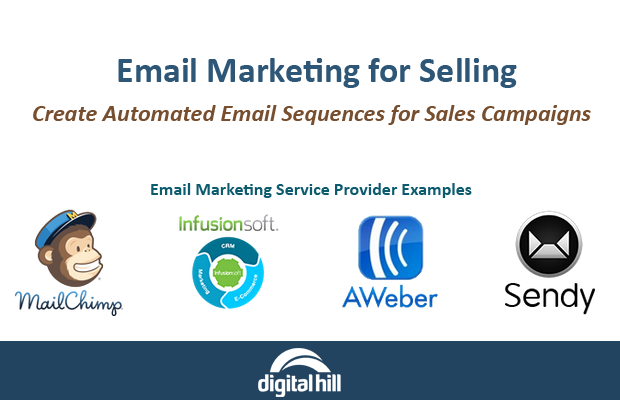Using Email Marketing to Sell

In a day when Social Media is the rage, the reality is that email remains as strong, if not stronger than ever, as a business means to educate and sell online. Email is a universally used tool that everyone sits down to check at work or home. Email gets a business in front of their prospects.
From a deeper business perspective, email marketing can be a key asset in delivering timely and focused information to customers and potential customers. At a minimum, businesses should be collecting email addresses from existing customers as a means to be able to continue to stay in contact with them and keep them updated on new products and services for future sales opportunities.
The often overlooked fact is that email can be key in the initial sales nurture process. It can essentially serve as a salesperson via automated sequences of emails after initial sign-up. This is valuable because business research has noted that it takes on average seven contacts with a business before they are ready to call or make a purchase. As well, new customers are doing online research and another study noted that 67% of buyers have already made their mind up and are ready to purchase before they contact a business!
A top priority, then, is growing your email list of prospective customers so that they can be nurtured in the email sales pipeline. That’s a topic to be covered another time. Below we want to outline what a business can do once they have new prospective customers on their email list.
Email Marketing Services
First, it’s critical to understand that to send bulk email to a large volume of email addresses, a business must use a email marketing software. This is critical because these type of software tools comply with anti-spam laws and they give valuable information on what happens per email recipient when a email is sent to a large list. If you try to send bulk email without an email marketing software, you’ll eventually get blocked for being a spammer and even your website could get blocked by Internet providers.
Email software refers to online services such as Constant Contact, MailChimp, Delivra, AWeber and iContact. There are numerous services to choose from. Typically they are subscription based services that you log into online to use. All employ mechanisms to allow tracking of email campaigns you send so that you can see how many people open the email and what links in the email they click on. Most importantly, they comply with anti-spam laws by having a “email unsubscribe” or “opt-out” feature within them. A company should never use Microsoft’s Outlook, Outlook Express, or similar desktop computer software to send bulk email.
Automating a Series of Emails
Many of these services offer “automation” or “nurture” email series options. This is the key element to focus on! A business can setup a series of emails that go out in a sequence that you set. A typical sequence is 4-6 emails sent out over 10 days so that users get an email every 1-2 days. Each email in the sequence should (1) build on the last email, (2) offer more value and resources, and (3) direct the user to more information on your website.
In this way the sequence of emails is connected and leads the viewer through a process that helps educate and answer the most frequent questions so that by the last email in the series your business can make an offer for them and they can have enough information and trust to be ready to make a purchase. The entire process can be automated so that upon a visitor to your website signing up to join your email list, they are entered into the list and the sequence starts and deploys based on their sign-up date.
The value to a business is that the sequence can work as a “salesperson” in that the visitor is getting regular information, key questions answered, and the sequence can be strategic to help the viewer become a buyer. The added benefit is that this is automated so that once it is setup, it runs continually. The business can view statistics on open rates, links clicked in the emails, and ultimately track sales back to the final offer in the sequence.
How’s your business doing with email marketing as a sales tool for gaining new customers?